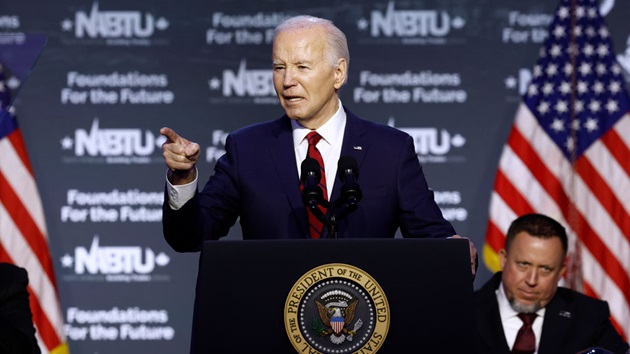
(WASHINGTON) -- Former President Donald Trump has blown up his fair share of deals on Capitol Hill, but Senate Minority Leader Mitch McConnell says Trump's decision to hold his tongue on a massive $95 billion foreign aid package -- including critical aid for Ukraine -- may have made all the difference in getting the legislation across the finish line.
McConnell had staked his legacy on passage of a national security aid package Tuesday night, securing billions in aid to Israel, Ukraine and Taiwan, and to get it done, he pushed back hard against the isolationist wing of his own party, convincing 30 other Republicans to join him.
And the win, he told ABC News in an interview Wednesday, will help persuade Trump to change his views as well.
McConnell was eager to talk about how he plans to make fighting isolationism his mission during his remaining time in the Senate, including after he steps aside as Republican leader in November.
"I am not leaving the Senate. And this is going to be my primary focus going forward, and I think it's important for us and for the rest of the world," he said.
McConnell as Reagan Republican
Trump, who has waded in to a number of legislative debates in recent weeks, did not directly weigh in on how members ought to vote on the Ukraine aid package. On Tuesday, the former president seemed to embrace House Speaker Mike Johnson, who stuck his neck out to ensure the package could get passed.
McConnell, who has had a tumultuous relationship with the former president, acknowledged that Trump's decision to get behind Johnson and to keep his opinions on Ukraine aid to himself may have swung his party more in the direction McConnell has been pleading them to go for over a year: away from isolationism, toward American global leadership.
"I think the issues typically reflect either your president of your party and office or the nominee for president, and I think a lot of the views Republicans at large are going to have will be based not on what we did in Congress but on where the nominee or president is," McConnell said. "I was encouraged by the fact that he allegedly embraced the speaker and decided to quit talking about this issue."
The Republican leader sees himself in the mold of Ronald Reagan, whose "peace through strength" worldview has become less and less visible in Trump's "America First" GOP.
At times, in the earliest stages of the debate over foreign aid, McConnell said he felt like the lone Reagan Republican in the room.
"In the beginning I sort of did," McConnell said, when asked if he felt isolated. "But I think it got better."
Demonstrating to Trump
For McConnell, the passage of this multi-pronged supplemental aid package was essential to demonstrating to Trump that globalist views can be popular with Republicans.
"I know how much he likes to win," McConnell said. "And this looks like a winning issue, not a losing issue."
That's why McConnell, who is stepping down this from his role as GOP leader in November after 18 years on the job, said he's not done pushing back on isolationism.
For now, McConnell feels he beat back the pull of isolationism in his party.
"At least on this issue, I think the isolationist movement didn't come that close," he said.
Says Trump opposing border deal helped clear the way
Though McConnell was ultimately successful in his efforts to get the bill passed, It took Congress over six months to move on President Joe Biden's supplemental aid request for Ukraine.
Part of the reason for that delay was an effort by Republicans to condition foreign aid on robust provisions to secure the U.S. southern border. That effort fizzled out after Republicans rejected a bipartisan deal containing many of the provisions that they themselves had insisted on.
McConnell said the border remains a looming issue that requires attention.
But he also concedes that choosing to focus on the border as part of the discussion about a foreign aid package may have been a costly distraction from dealing with the original national security supplemental request.
And former President Trump is the one who ultimately cleared the deck.
"I would love to solve the border problem, we actually tried," McConnell said. "But most of my colleagues decided it wasn't good enough and the former president said he'd rather it not be done at all, and so that kind of moved the border away."
With the border issue formally quashed, members were able to get behind the bill more easily. It's part of the reason that McConnell believes the package picked up nine additional Republican supporters between its consideration in February and Tuesday night's passage.
"I think once the border issue was settled, not in a way that all of us preferred, but clearly nothing was going to happen, you had the original supplemental there," McConnell said.
"I think once members focus on the facts, just the facts, it's very hard to argue against the proposal," he said.
Trump's opposition to the border provision may have, in the end, been a critical component of getting foreign aid passed.
Foreign aid passage makes Reagan-type approach 'look like a winner'
Johnson sat on the Senate supplemental bill for more than two months. He eventually let the House of Representatives vote on the bill in pieces after Trump bowed out of expressing a direct opinion on how members ought to proceed.
"He gave everybody a chance to vote, which is a good way to figure out how will pass and what won't," McConnell said of Johnson's manuevering. "And I think that was really, in his situation, a pretty courageous decision."
Johnson faced threats to lose his gavel over advancing the foreign aid package in part due to an increasingly isolationist House GOP Conference. In the Senate, about 70% of Republicans backed the foreign aid package. But more than half of House Republicans rejected Ukraine aid.
McConnell blames the anti-Ukraine sentiments among Republicans in both chambers on ousted Fox News commentator Tucker Carlson.
"Tucker Carlson had a massive audience that was a lot of rank and file Republicans, starting carving on Ukraine," McConnell said. "And the former president was skeptical about it. And that had a huge impact on public opinion."
But Tuesday night's vote, McConnell believes, is a critical step in changing public opinion, especially as he seeks to lead his members towards reclaiming the Senate in November's elections.
"Tuesday makes the Reagan-type approach look like a winner, not a loser," McConnell said. "And I think that's the beginning of changing public sentiment."
Copyright © 2024, ABC Audio. All rights reserved.






















